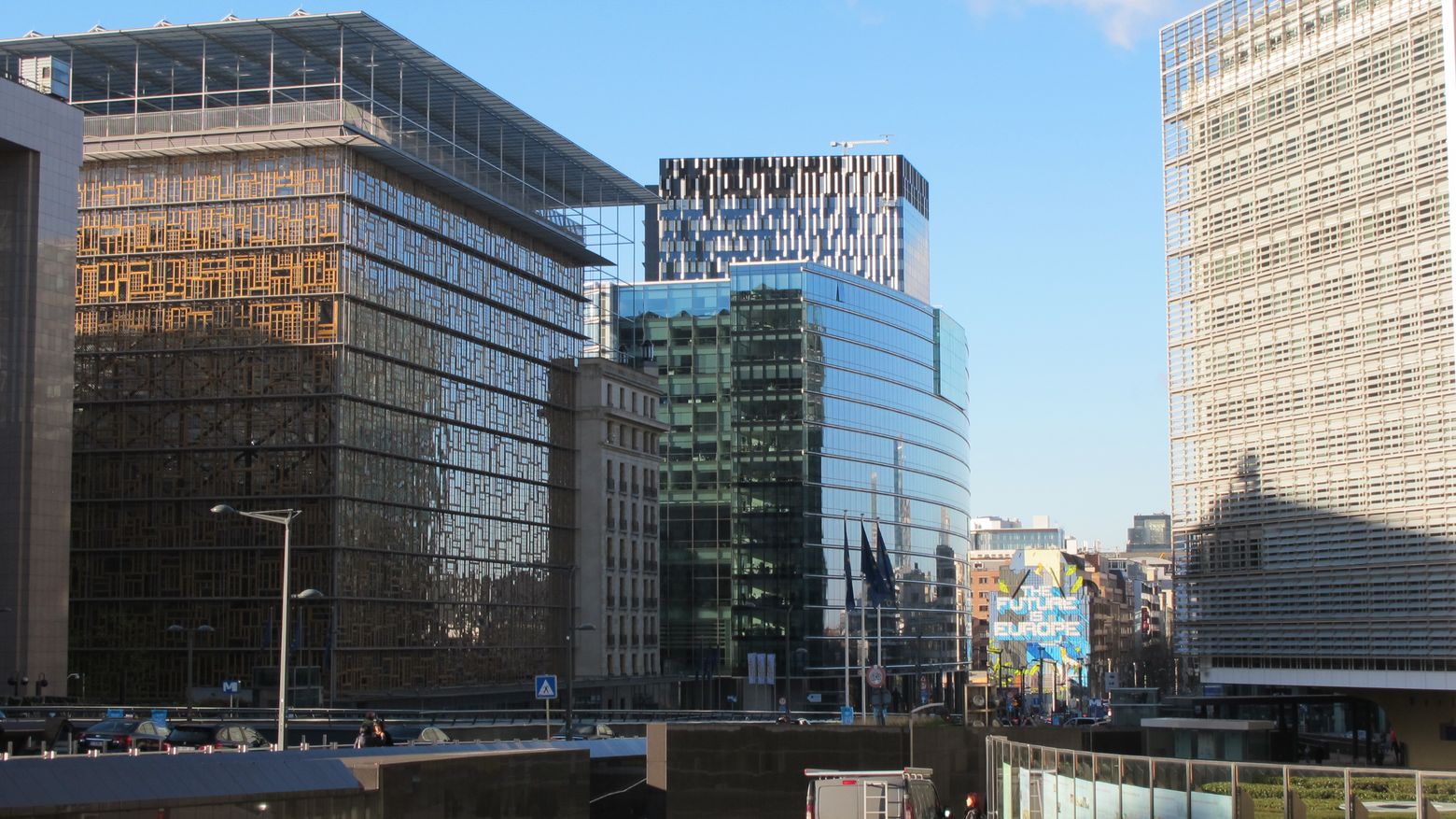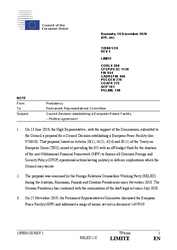Rund 5 Milliarden Euro wollen die EU-Mitgliedstaaten in den kommenden sieben Jahren zusätzlich zum EU-Haushalt aufbringen, um die sogenannte „European Peace Facility“ (EPF) zu finanzieren. Mit dem neuen Finanztopf sollen Aktivitäten der Gemeinsamen Sicherheits- und Verteidigungspolitik und Missionen von Regionalorganisationen (z.B. der Afrikanischen Union) finanziert werden. Zudem sollen damit Ausbildung und Ausrüstung für Armeen in Drittstaaten bezahlt werden. Das Budget dient der Intensivierung von Militärkooperationen sowohl in Afrika (im Fokus steht vor allem die konfliktreiche Sahelregion), als auch darüber hinaus, also im weltweiten Radius. Die EPF wird „off-budget“, als gemeinsamer Fonds jenseits des Gemeinschaftshaushalts eingerichtet, da aus diesem laut EU-Vertrag keine militärischen und verteidigungspolitischen Ausgaben getätigt werden dürfen.
Am 22. März wurde die Übereinkunft zur EPF, die die Mitgliedstaaten im Dezember 2020 trafen, nun formell per Ratsbeschluss angenommen und ist damit in Kraft getreten. Sie wurde von allen Mitgliedstaaten gebilligt. Obgleich im Vorfeld einige wenige Länder signalisierten, selbst keine Waffen liefern zu wollen, verpflichteten sich diese aber dennoch, das Instrument zu unterstützen und sich in vollem Umfang finanziell zu beteiligen. Das EU-Parlament wird an diesem Projekt nicht beteiligt, und auch die nationalen Parlamente werden keine Einsicht in die Programmplanung erhalten. Mitglieder der Fraktion der Grünen (Greens/EFA) im EU-Parlament wiesen auf das damit verbundene Demokratiedefizit hin. Die deutsche EP-Abgeordnete Hannah Neumann bezeichnete die EPF als „Paradigmenwechsel“ in der EU-Politik. In der Tat geht es hier nicht nur um eine neue außenpolitische Richtungsentscheidung (für Waffentransfer mit EU-Siegel), sondern auch um eine neue Qualität von Grauzone im Hinblick auf die demokratische Kontrolle von Außenpolitik. Das Parlament hatte im Vorfeld einen Katalog mit Empfehlungen veröffentlicht und auf Mitsprache in dieser sensiblen Angelegenheit gedrängt, musste sich jedoch mit einem flüchtigen Briefing zur EPF begnügen.
Risiken und Nebenwirkungen: Rüstungsexport in instabile Regionen
Über die Risiken und Nebenwirkungen des neuen EU-Instruments haben europäische NGO-Netzwerke und Kirchliche Hilfswerke in den vergangenen Wochen und Monaten ausführlich informiert. (Auch in diesem Blog finden sich dazu umfangreiche Beiträge, siehe Blogbeitrag vom 14.3.2021 und vom 24.11.2020) Das ARD-Magazin Monitor hat am 11.3.2021 dazu eine Sendung ausgestrahlt, die am Beispiel der „Ertüchtigungsmaßnahmen“ der EU in Mali auf die Gefahren aufmerksam machte. Allen bisherigen Erfahrungen zum Trotz sind die Mitgliedstaaten jedoch davon überzeugt, dass sie dieses Instrument benötigen. Auch auf den Transfer von Rüstung wollen sie nicht verzichten. Kritiker*innen werden auf angebliche umfangreiche „Sicherungsmaßnahmen“ verwiesen, die in einem „methodologischen Rahmen“ dargelegt worden seien. Diese sind jedoch gespickt mit „Kann"-Bestimmungen und wachsweichen Formulierungen und kaum geeignet, Schaden zu vermeiden (siehe Blogbeitrag vom 14.3.2021). Leider hat der Rat die beiden zentralen Dokumente, welche die politische Übereinkunft begleiten ("General Guidelines; Proposed Priorities for Assitance Measures 2021-23"; "Providing Military Technology and Equipment in the Framework of the EPF; Basic Principles for Compliance and Control", also das sogenannte "Safeguards Paper") der Öffentlichkeit bislang nicht zur Verfügung gestellt.
NGOs kritisieren Zuschnitt der EU-Peace Facility
Ende 2020 appellierten 40 NGOs aus den Mitgliedstaaten der Union in einer gemeinsamen Stellungnahme an die EU-Institutionen, den Zuschnitt der „Peace Facility“ zu überdenken und auf Waffenlieferungen zu verzichten. Auch sie sehen in dem Ratsbeschluss einen Paradigmenwechsel. Einige von Ihnen (darunter Brot für die Welt), und auch Organisationen aus der Sahel-Region, in denen die EU diverse militärische Ausbildungsmaßnahmen unterhält, kritisierten den gestrigen EU-Ratsbeschluss zur “Peace Facility” nun erneut in einem gemeinsamen Statement. Dieses trägt den Titel:
“EU leaders adopt 5 billion euros fund to train and equip security forces and militaries worldwide that risk fueling armed conflict”.
In der Einleitung heißt es:
“Today, EU leaders adopted the European Peace Facility (EPF), a new fund that will allow the EU to train militaries around the world and equip them with lethal weapons. This is despite experts - including civil society - raising their concerns that the fund could worsen conflicts and contribute to human rights abuses in unstable regions. This EU fund will replace several European foreign and defence policy funds such as the African Peace Facility - which finances security assistance and other military operations in African countries including Somalia and the Sahel region. The EPF differs, however, from its predecessors. Firstly, it is global in its mandate. Secondly – and crucially – it opens the door for the EU to fund ‘lethal equipment’ such as machine guns, pistols and ammunition. The EU is not allowed to spend its budget on weapons, so EU member states have circumvented the EU treaties prohibiting this by creating an off-budget fund. This marks a troubling change in EU foreign policy. As European countries are starting to plan how to distribute these funds, civil society experts and analysts in Europe and Africa react."
Stimmen aus der Sahel-Region
"We are very worried about the recent adoption of the EPF - despite civil society's warnings, the necessary safeguards to ensure the activities are conducted in accordance with the EU and Member State's human rights obligations were not included in the final text. The possibility for EU Member States to transfer lethal weapons to armed forces in the Sahel without adequate control is particularly alarming, given these forces' implication in many human rights violations in the region." Drissa Traoré, Coordinator of the Joint Office of FIDH (International Federation for Human Rights) and AMDH (Association Malienne des Droits de l'Homme) in Mali.
"For us in Mali, stabilization means stabilization of the military status quo, and this needs to change." Assitan Diallo, President, Association des Femmes Africaines pour la Recherche et le Développement (AFARD), Mali.
“In a high level conference on the security crisis in the Sahel, held in Bamako in February 2021, researchers, experts, Western and African diplomats, senior officials of African governments, as well as officers of security and defence forces all recognised the insolence and limits of the current military approach to fight against the insecurity in this area. So if all the experts concerned agree, what justifies the enthusiasm of European official to provide additional weapons to the Sahel ?” Olivier Guiryanan, Executive Director of BUCOFORE, Chad.
Kommentare aus der europäischen Zivilgesellschaft
"Providing weapons and ammunition to fragile countries is not the expertise or added value of the European Union. This, like most train and equip endeavours will cost human lives and fail to address the root causes of insecurity." Sonya Reines-Djivanides, Executive Director, European Peacebuilding Liaison Office (EPLO) (Brussels).
“This fund allows European countries to sell weapons to conflict-torn countries without robust controls. This flies in the face of the EU’s aim to preserve peace. In many of these countries, the black market for weapons is thriving and this move by the EU could make it easier for local militia and armed groups to get their hands on weapons, causing only more instability and suffering. Instead of fueling conflict, the EU needs to listen to people on the ground. In the Sahel, our local partners demand good governance, policies that work for all communities and a strong civil society.” Julien Vaissier, Oxfam EU Conflict and Humanitarian Advisor (Brussels).
“Today marks a concerning moment for the EU. There are serious risks involved with training and equipping security forces in conflict areas. As an organisation working with people affected by conflict around the world, we see how these activities often escalate conflict, and can also lead to attacks on civilians. The EU and its member states must urgently put in place measures to reduce these risks, and must be responsive and accountable in the case of abuses.” Anna Timmerman, Director, PAX (Netherlands).
“The decision to include weapons in the European Peace Facility stands in stark contradiction with the EU’s commitments to peace. In a context of growing authoritarianism around the world, boosting the combat capability of repressive partners will have unintended consequences and fuel conflict and instability. EU leaders should refrain from training and equipping security forces in countries where assistance may end up in the wrong hands or be used for repression or abuses. Going forward, the EU should work closely with civil society in conflict-affected countries to ensure that EPF-funded assistance contributes to human security and accountability of security institutions.” Tuuli Räty, EU Policy and Advocacy Officer, Saferworld (Brussels).
“The EPF features a risky innovation: it enables the EU, for the first time, to deliver military training and lethal equipment to third states, ad-hoc military coalitions or peace support operations. (…) Despite the EU’s endeavours to mitigate risks, such equipment can be misused to further violence, as governments of fragile states often have poor governance and management systems to handle it. (…) The EU should not provide lethal equipment in fragile states, and instead prioritise other assistance measures. It should also shape its interventions within political strategies whose priorities are governance reforms, community reconciliation and the restoration of the social fabric”. Giuseppe Famà, Head of EU Affairs, International Crisis Group (Brussels)
Building the capacity of local security and defense forces can provide opportunities for enhancing the protection of civilians, but force assistance can also lead to substantial risks for civilians in conflict as partners may have different capabilities and protection frameworks. As the European Union develops more robust approaches to security force assistance through the creation of the EPF, CIVIC recommends civilian harm mitigation be integrated at all levels of partnership through the implementation of strong and consistent safeguards. Local and international civil society and grassroots communities should be closely consulted and coordinated with at all stages of EPF-funded measures.” Beatrice Godefroy, CIVIC Europe Director.
“The EPF will most likely contribute to arms proliferation in unstable regions. Recipients identified as “friends” and “partners” today might transform into “enemies” tomorrow. The EU should not look at “security” through “military” lenses but rather focus on “human security”, addressing the needs of each individual and population affected by violent conflict. It should fight the root causes, not the symptoms. The EU can provide economic perspectives and stability via development cooperation, mediation and support for local peacebuilders. “Train & equip” programs for the military might harm the EU’s potential as a “bridge builder” in international relations.” Dr Martina Fischer, Policy Advisor, Bread for the World, Berlin, Germany.
(Hinweis: Jede Organisation ist ausschließlich für das jeweils angegebene Zitat verantwortlich)






